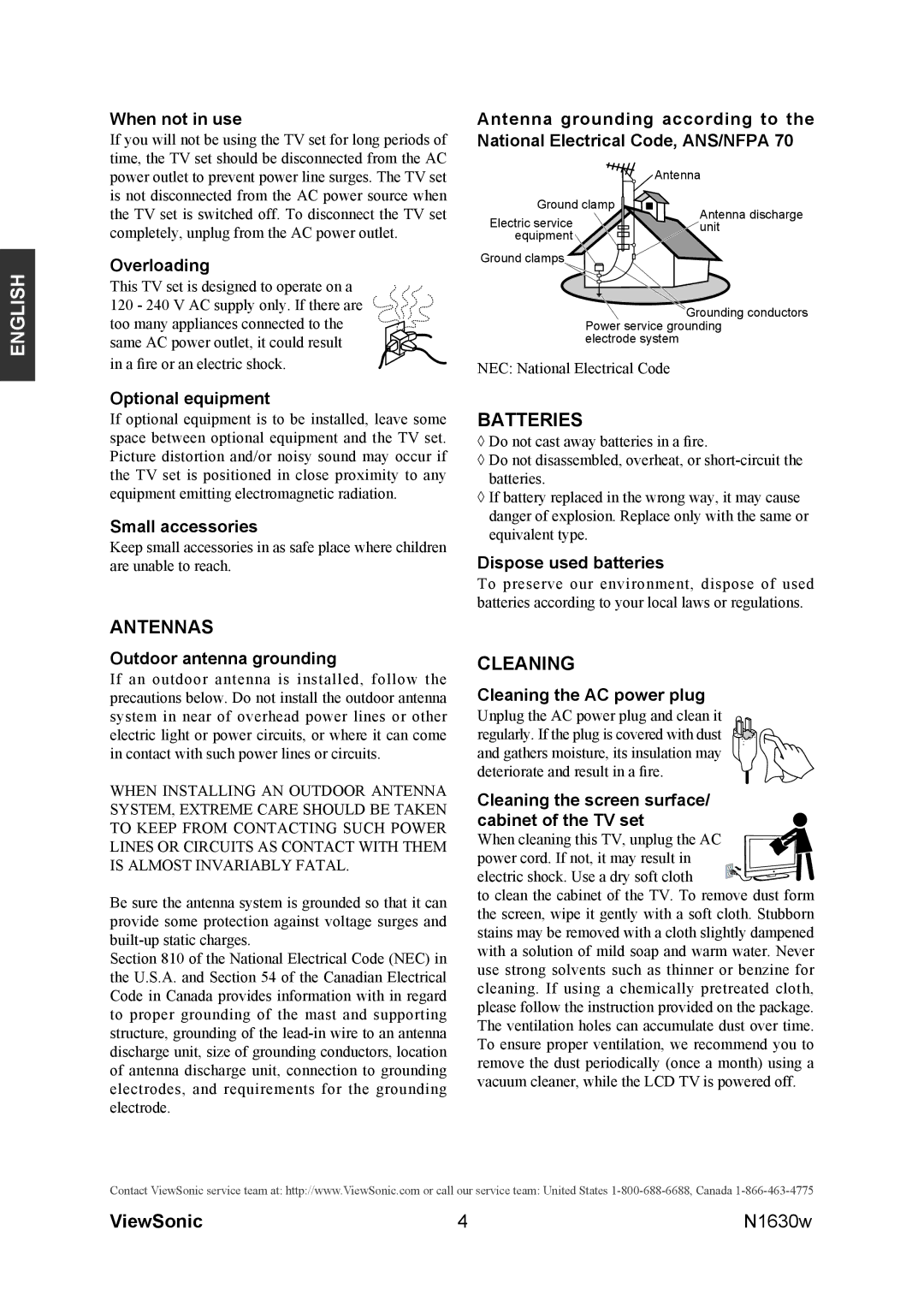
ENGLISH
When not in use
If you will not be using the TV set for long periods of time, the TV set should be disconnected from the AC power outlet to prevent power line surges. The TV set is not disconnected from the AC power source when the TV set is switched off. To disconnect the TV set completely, unplug from the AC power outlet.
Overloading
This TV set is designed to operate on a 120 - 240 V AC supply only. If there are too many appliances connected to the same AC power outlet, it could result
in a fire or an electric shock.
Optional equipment
If optional equipment is to be installed, leave some space between optional equipment and the TV set. Picture distortion and/or noisy sound may occur if the TV set is positioned in close proximity to any equipment emitting electromagnetic radiation.
Small accessories
Keep small accessories in as safe place where children are unable to reach.
ANTENNAS
Outdoor antenna grounding
If an outdoor antenna is installed, follow the precautions below. Do not install the outdoor antenna system in near of overhead power lines or other electric light or power circuits, or where it can come in contact with such power lines or circuits.
WHEN INSTALLING AN OUTDOOR ANTENNA SYSTEM, EXTREME CARE SHOULD BE TAKEN TO KEEP FROM CONTACTING SUCH POWER LINES OR CIRCUITS AS CONTACT WITH THEM IS ALMOST INVARIABLY FATAL.
Be sure the antenna system is grounded so that it can provide some protection against voltage surges and
Section 810 of the National Electrical Code (NEC) in the U.S.A. and Section 54 of the Canadian Electrical Code in Canada provides information with in regard to proper grounding of the mast and supporting structure, grounding of the
Antenna grounding according to the National Electrical Code, ANS/NFPA 70
| Antenna | |
Ground clamp | Antenna discharge | |
Electric service | ||
unit | ||
equipment |
|
Ground clamps
Grounding conductors
Power service grounding electrode system
NEC: National Electrical Code
BATTERIES
◊Do not cast away batteries in a fire.
◊Do not disassembled, overheat, or
◊If battery replaced in the wrong way, it may cause danger of explosion. Replace only with the same or equivalent type.
Dispose used batteries
To preserve our environment, dispose of used batteries according to your local laws or regulations.
CLEANING
Cleaning the AC power plug
Unplug the AC power plug and clean it regularly. If the plug is covered with dust and gathers moisture, its insulation may deteriorate and result in a fire.
Cleaning the screen surface/
cabinet of the TV set When cleaning this TV, unplug the AC power cord. If not, it may result in
electric shock. Use a dry soft cloth
to clean the cabinet of the TV. To remove dust form the screen, wipe it gently with a soft cloth. Stubborn stains may be removed with a cloth slightly dampened with a solution of mild soap and warm water. Never use strong solvents such as thinner or benzine for cleaning. If using a chemically pretreated cloth, please follow the instruction provided on the package. The ventilation holes can accumulate dust over time. To ensure proper ventilation, we recommend you to remove the dust periodically (once a month) using a vacuum cleaner, while the LCD TV is powered off.
Contact ViewSonic service team at: http://www.ViewSonic.com or call our service team: United States
ViewSonic | 4 | N1630w |
